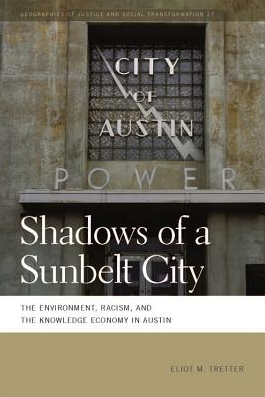
- This event has passed.
Eliot Tretter – Shadows of a Sunbelt City
April 27, 2016 @ 7:00 pm - 8:00 pm
Book talk and signing with Book People
Austin is generally depicted as one of the great urban success stories of the past half century – a place that has grown enormously through “creative class” strategies that emphasize diversity and environmental consciousness. Eliot Tretter’s book reinterprets this familiar story by exploring the racial and environmental underpinnings of the postindustrial knowledge economy. Join Book People for a lively and informative discussion of Austin’s past, present, and future.
ABOUT SHADOWS OF A SUNBELT CITY
Austin, Texas, is often depicted as one of the past half century’s great urban success stories—a place that has grown enormously through “creative class” strategies emphasizing tolerance and environmental consciousness. In Shadows of a Sunbelt City, Eliot Tretter reinterprets this familiar story by exploring the racial and environmental underpinnings of the postindustrial knowledge economy. He is particularly attentive to how the University of Texas—working with federal, municipal, and private-sector partners and acquiring the power of eminent domain—expanded its power and physical footprint. He draws attention to how the university’s real estate endeavors shaped the local economy and how the expansion and upgrading of the main campus occurred almost entirely at the expense of the more modestly resourced communities of color that lived in its path.
This book challenges Austin’s reputation as a bastion of progressive and liberal values, notably with respect to its approach to new urbanism and issues of ecological sustainability. Tretter’s insistence on documenting and interrogating the “shadows” of this important city should provoke fresh conversations about how urban policy has contributed to Austin’s economy, the way it has developed and changed over time, and for whom it works and why. Joining a growing critical literature about universities’ effect on urban environments, this book will be of interest to students at all levels in urban history, political science, economic and political geography, public administration, urban and regional planning, and critical legal studies.



